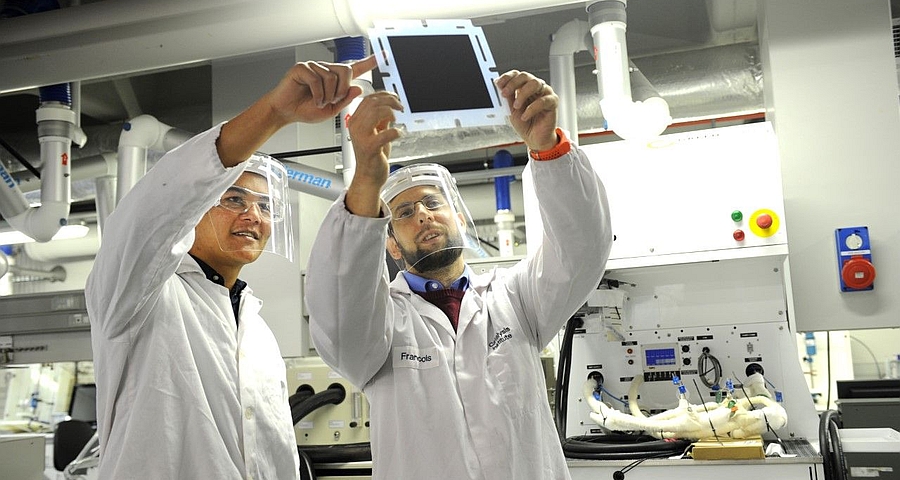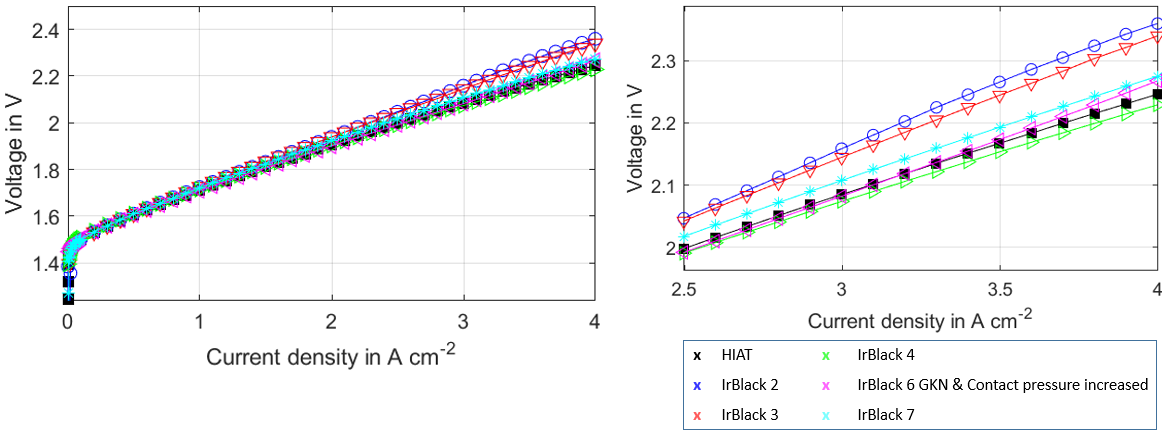The aim of the project is to develop high-performance membrane electrode assemblies for polymer electrolyte membrane (PEM) water electrolysis. Two institutes and a start-up from South Africa and Germany are working on this together.

Development of membrane-electrode assemblies © Lerato Maduna | University of Cape Town
Projects and goals
The HySA Catalysis competence centre, a research institute for hydrogen and fuel cell technology in South Africa, specialises in the synthesis of catalysts and the manufacture of membrane-electrode assemblies (MEA).
As part of the Rainbow project, new preparation techniques are being developed in the institute in Cape Town in order to manufacture new MEAs with the most modern materials. In addition, high-performance catalysts are used and the use of metal oxide support materials is implemented. All MEAs are characterised in electrolysis at the Institute for Electrical Energy Systems (IfES) at Leibniz University Hannover (LUH) in order to measure the performance and durability of the MEAs.
After completing all tests in the full electrolysis cell, the MEAs are examined for their structure at HySA Catalysis. Scanning electron microscopy with dispersive X-ray spectroscopy is used for this. The entire development is flanked by a model developed by the LUH-IfES. The knowledge gained through the model is incorporated into the evaluations of the generations of MEAs examined.

Current-voltage characteristics for the characterisation of membrane-electrode assemblies © Boris Bensmann | LUH-IfES
Use of the results
The improvement of the catalysts for the sluggish oxygen evolution reaction, which is the focus of the Rainbow project, enables new approaches to the design of the anode catalyst layer in the short term. Ultimately, catalyst layers can be developed that contain less of the expensive and limited available iridium and at the same time do not entail any loss of performance.
The results achieved will be shared with the electrolysis community while the project is still running. The open exchange helps to ensure that scientific and technological innovations are absorbed more quickly.
In particular, the complementary expertise of the project partners plays a decisive role in successful implementation. As a third project partner, the start-up HyPlat from South Africa brings experience in the field of large-scale, technical and economic production of fuel cell components. If the project is successful, the three generations of membrane electrode units will then be brought to market maturity (TRL 9) in order to expand HyPlat's product portfolio to include PEM water electrolysis. The products resulting from the cooperation would be of great interest to PEM electrolysis manufacturers because the demand for water electrolysers is increasing while the use of metals from the platinum group as catalysts is expected to decrease.
Added value of international cooperation
International cooperation is fundamentally important to cope with the challenges of the climate crisis. In South Africa and Germany, hydrogen is seen as an important part of the future climate-neutral energy system.
On the German side, goals, ambitions, fields of action and necessary steps were presented in the national hydrogen strategy in 2020. South Africa had already developed a National Hydrogen and Fuel Cell Technologies Research, Development and Innovation (NHFCT RDI) strategy in 2008. On a social and political level, this international cooperation can therefore contribute to realiing the ambitious goals of the Paris Agreement of 2015 (COP 21).
In addition, the project partners HySA Catalysis and HyPlat are made familiar with the principle of contract research. Building on this, a long-term research and innovation partnership is planned with the goal of an H2 technology axis between Germany / EU and South Africa / AU.
Contact persons for RAINBOW:
Prof. Dr. Richard Hanke-Rauschenbach
Gottfried Wilhelm Leibniz Universität Hannover
Institute for Electric Power Systems (IfES)
Tel.: +49 511 762 14401
Dr.-Ing. Boris Bensmann
Gottfried Wilhelm Leibniz Universität Hannover
Institute for Electric Power Systems (IfES)
Tel.: +49 511 762 14404







